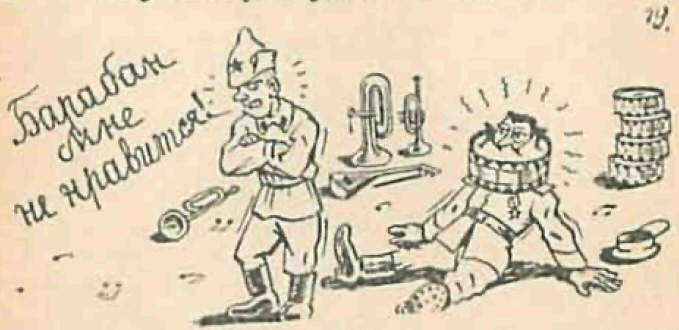
|
Languages
|
|
| Russian for English speakers 19 |
 |
| Lesson 19 |
|
Russian |
English Английский |
|
|
51 - пятьдесят один |
fifty one |
|
|
52 - пятьдесят два |
fifty two |
|
|
53 - пятьдесят три |
fifty three |
|
|
54 - пятьдесят четыре |
fifty four |
|
|
55 - пятьдесят пять |
fifty five |
|
|
Девятнадцатый (19-й) урок |
Nineteenth lesson |
|
|
УРОК НОМЕР ДЕВЯТНАДЦАТЬ (№19) |
Lesson number nineteen (#19) |
|
| Покажите ! |
Show (me)! |
|
|
Покажите мне! |
AK: Compare with |
|
| 1 | Мне нужна какая-нибудь игрушка (1). | I need [to me necessary] any (kind of a) toy. |
|
AK: It means "I need some kind of toy." |
||
| 2 | Сколько лет вашему ребёнку? (2) | How old (is) your child [how many years to your child]? |
| AK: Word by word: How-many years to-your child. | ||
| 3 | Ему завтра будет шесть лет. | He will be six to-morrow [to him tomorrow will be 6 years]. |
| 4 | Пожалуйста. Вот лестница; | Excuse me. Here-are (the) stairs; |
|
AK: This means "Please, here's a stairway". |
||
| игрушки (3) внизу. |
toys (are) downstairs. |
|
|
AK: игрушки внизу is "toys are /at down/" |
||
| 5 |
Эта (4) игрушка хорошая... |
This toy (feminine) (is) good, |
| но я не то хочу... | but it is not what I want [but I (do) not this want], |
|
|
AK: this means "but I want not that..." |
||
| вот лучше. | that [here is] (is) better. | |
| 6 | Жаль, здесь всё дорого... | (It's a) pity; everything here (is) dear. |
| AK: This means "It's a pity, here everything is expensive." | ||
| 7 | Я ищу дешёвый подарок... | I am looking [look] for (a) cheap present [present cheap]. |
| AK: Compare: "I'm looking for not expensive present." | ||
| 8 | Может быть этот барабан? | May-be this drum? |
| 9 | Нет, уж (5) спасибо; | No thank you very-much ; |
|
AK: This is some kind of joking pattern with
уж (already). |
||
| барабан мне не нравится. | (the) drum (does) not appeal to me. | |
| AK: This means "I don't like the drum." | ||
| 10 | Вот красивый альбом; | Here-is (a) fine album ; |
|
AK: красивый - beautiful |
||
| цена небольшая: двенадцать рублей. |
(the) price (feminine) (is) not high [big] ; 12 roubles. |
|
| 11 | Покажите... Это ваша последняя цена? | Let me see [show (me)]. (Is) this your lowest [last] price? |
|
Покажите мне - show (you pl.) to-me |
||
| Всё-таки дорого. | Anyway (it is) dear. | |
| AK: This means "It's still expensive." | ||
| 12 |
какой-нибудь; какая-нибудь; какое-нибудь |
(Of) any (kind) (masculine; feminine; neuter). |
| 13 | лучше; | better; |
| дешёвый; дешёвая; дешёвое. |
cheap / inexpensive (masculine; feminine; neuter). |
|
| 14 | красивый; красивая; красивое; | beautiful (m / f / n); price. |
| цена. | ||
| 15 | большой; большая; большое; | great, big (m / f / n) : |
| она мне нравится. | she appeals to me. | |
| AK: This means "I like her." | ||
| 16 | дорогой; дорогая; дорогое; | dear / expensive (m / f / n) ; |
|
AK: дорогой can mean both "expensive"
and "dear", like in |
||
| дорого (6); |
dear / costly, expensive (adverb) : |
|
| я ищу. | I look for / I'm searching. | |
|
УПРАЖНЕНИЕ |
EXERCISE. | |
| 1 | Ребёнку нужна игрушка. |
(The) child needs to (the) child (is) necessary] (a) toy. |
| 2 | Ваша мать ждёт вас внизу. | Your mother awaits you downstairs. |
| 3 | Покажите ей этот альбом; | Show her this album; |
| она будет очень рада. | she will be very glad. | |
| 4 | Какая красивая комната! |
What (a) beautiful bedroom (feminine) ! |
| 5 | Какой красивый подарок! | What (a) beautiful present (masculine) ! |
| 6 | Какое красивое пальто! | What (a) beautiful overcoat ! (neuter). |
| 7 | Как вам нравится наш город? | How (does) our town appeal to you? |
|
AK: This means "What do you think about our town?" |
| NOTES. | |
| 1 |
Игрушка
toy, (from
играть , to play) is feminine, as
its final а shows. |
| 2 |
Ваш ребёнок
(riebbiawnok)
your child. |
| 3 |
Игрушка:
toy;
игрушки: toys.
|
| 4 |
Это, which we know, is
this (impersonal pronoun) or this (demonstrative adjective)
before a neuter (ending in о).
|
| 5 |
Уже :
already; |
| 6 |
In дорого (adverb), stress the first syllable. |
|
Tweested English Section
Genders : we first make a rough
study, confining ourselves to general lines. |